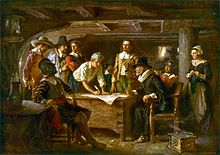
1) What concepts are included in the Mayflower Compact?
First and foremost, the Mayflower Compact, like all other English documents in this era, confessed its faith in the Christian religion. All of the ideas, practices, and beliefs involved in the document was said to be done in the name of God. Its writers pledged their obedience and service to their mother country and, in turn, agreed to follow, create, and enforce laws that will benefit the whole of the colony (not the individual). The Compact also mentions the belief of unity, of becoming one civil force that works together to help not only themselves, but to England as well.
2) How does the Mayflower Compact reflect and attachment to both the "Old" and "New" worlds?
The Mayflower Compact refers to "Old" world beliefs when it portrays their king, King James. References such as the Defender of Faith, a religious title, relate to the extremist faith people had in the Anglican Church, and the rest of Europe's utmost belief in the Catholic Church. Furthermore, the Mayflower Compact professes the imperialistic need to expand in the northern-parts of their pre-established colony. The New world ties in the Compact is most noted in the belief of a Democratic-like government. The belief that the colonists could create their own government, unite as a whole, and adhere to their own laws was unheard of in England at the time. Not only that, but the document also mentions the creation of a constitution, an aspect of government that was not provided overseas. Although the Mayflower Compact adheres to the obedience and loyalty to England, the freedom it provides noticeably out-weighs the negatives.
3) How did the Fundamental Orders of Connecticut differ from the Mayflower Compact?
The Mayflower Compact only went into the basics and the gist of how the colonists should create their Democratic-styled government. The Fundamental Orders of Connecticut not only explained what the colonists should do, but how they should do it too. It explains that the people should elect their own government officials, and those officials will elect their own Governor of the state. There will be two meetings between the town officials and the Governor per year (the first one will be about politics and the second will determine laws and law making). The Mayflower Compact only laid out the top layer for how the colonists should act (only generalizations and not direct laws) whereas the Fundamental Orders of Connecticut displays the entire 'blueprint' for how the government, lawmaking, and people's influence should be built. In summation, the Compact only displayed the desire to create the government and the Orders was the actual plan.
4) What prompted the colonists of Connecticut to take this approach to government, i.e.: use of a written Constitution?
If you only read the preamble of the Fundamental Orders, the reason would clearly be to appease the one, almighty God of the Christian faith. However, this is the only blatant reference to religion in the rest of the document. The rest of the inspiration, I believe, comes from the basic roots of England dating back to the Magna Carta. All the peoples of society, be it commoners, magistrates, or the governor, need to adhere to the laws. The Fundamental Orders provides a more open rule for the colonists in the strict and rigid Parliamentary government of England.
5) In what significant way(s) does the Fundamental Orders reflect a fear of and safeguard against the usurping of power by one person or a chosen few?
There is a clear-cut and fully explained way of how the government should be set up. There are annual elections for both the magistrates and the governor. The magistrates from each town are the ones who vote for the governor. At each town, the people hold meetings that discuss and vote for the delegates that will represent them as magistrates in the government. By doing this, the creators of the document not only laid forth a simpler form of a Democratic government, but they created an effective and non-complaintive system of voting for officials in government. The people got what they wanted.

No comments:
Post a Comment